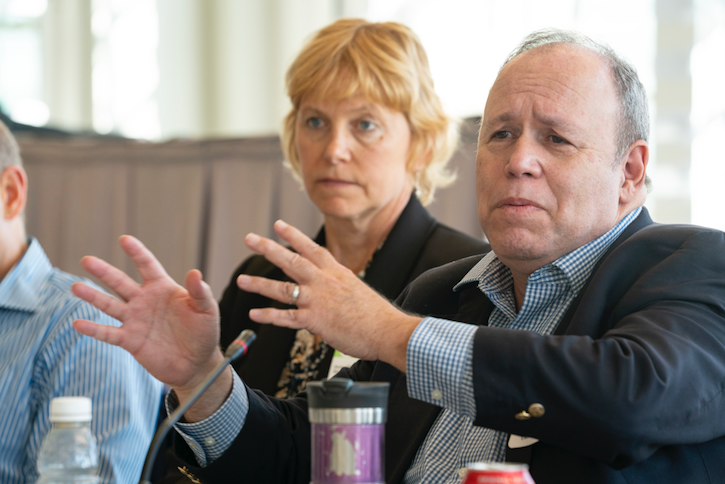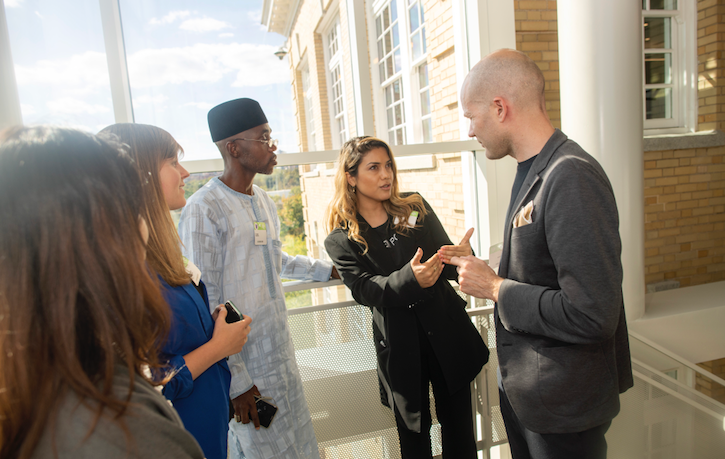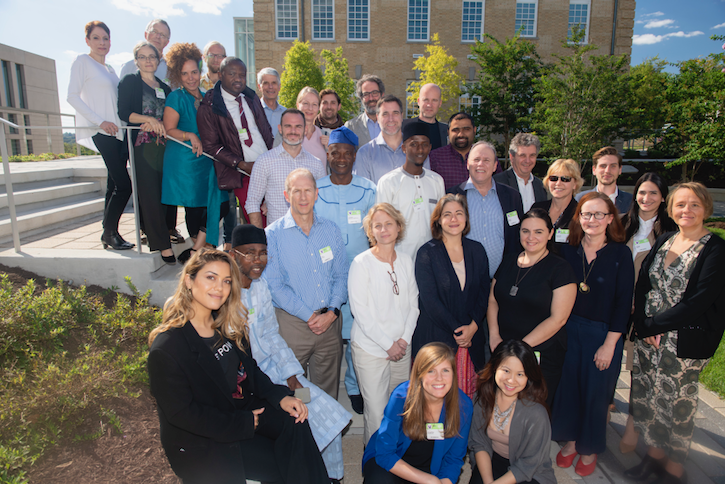.png)
Participants from government agencies, universities, NGOs, and civil society gathered at USIP on October 4, 2019, for a workshop on “Improving the Impact of Reconciliation.” (Photo credit: Evan Cantwell/Creative Services/George Mason University)
By Annalisa Jackson
On the morning of October 4, 2019, leading practitioners and scholars from government agencies, universities, and NGOs gathered at the United States Institute of Peace in Washington, D.C., for a one-day workshop on “Improving the Impact of Reconciliation.”
During the workshop, which was organized by the Mary Hoch Center for Reconciliation (MHCR) with Inclusive Peace and the United States Institute of Peace (USIP), the conceptual frameworks of reconciliation and best practices in post-conflict reconciliation processes were discussed, highlighting the experiences of local peace activists and reconciliation practitioners from Nigeria, Colombia, and Iraq.
The workshop was the first event organized by the Mary Hoch Center, the newest center at the School for Conflict Analysis and Resolution at George Mason University in Arlington, Virginia. As MHCR is committed to bringing scholars and practitioners of reconciliation together to research reconciliation practices and develop the impact of ongoing and future reconciliation processes, this workshop marked an exciting beginning to its activities.
The breadth of backgrounds represented among the workshop participants reflected the many forms that reconciliation processes can take.
“It’s a relief to see that there are many variations on the definitions,” commented Beatrix Austin from the Berghof Foundation after a mapping on reconciliation was presented by Simon Keyes of Winchester University. Keyes’ mapping presented the widely differing conceptualizations of reconciliation, ranging from community to state-level and from “minimalist” to “maximalist” approaches. His presentation began the morning’s discussion on the conceptual framework of reconciliation.
“What’s necessary is not to be overwhelmed by all the definitions but actually to locate ourselves on which type of reconciliation we are working with,” Austin continued. In her own presentation, Austin highlighted that reconciliation often happens in complicated and messy contexts and requires both humility and caution. She suggested that “our intentions should be in strengthening the field and keeping reconciliation people-centered.”

Marc Gopin, Professor of World Religions, Diplomacy and Conflict Resolution at the School for Conflict Analysis and Resolution, participated in the workshop. (Photo credit: Evan Cantwell/Creative Services/George Mason University)
During the workshop, the presentation of case studies reinforced the need for people-centered approaches to reconciliation.
Grainne Kelly of Ulster University gave a presentation highlighting the reactions that many communities have had to the term “reconciliation” in Northern Ireland. Some, she shared, have found the term to be highly politicized and unhelpful, while others have found it hopeful and inspiring. Her research indicated, however, that few people consider their own role in the reconciliation process, placing significant responsibility on others—particularly victims and survivors—to make bold reconciliatory leaps alone.
The various presentations gave the gathered participants food for thought around how to ensure that reconciliation processes serve the communities in which they are implemented.
“Instead of searching for definitions and processes, can we think of [reconciliation] as being a question in any given situation?” asked Keyes. That question, he suggested, could be, “How are you going to move from a divided past to a shared future?” In encouraging communities to envision their future, he suggested they may be empowered to think about their own solutions. Participants agreed that in doing so, they could begin rebuilding and transforming relationships among people and between state institutions and society.
Participants acknowledged that in practice the use of the term ‘reconciliation’ is perceived much differently than when it is addressed in theoretical discussions, which presents a need for guidelines on its use that are still cognizant of context.
“We need a deep contextual knowledge of everyone’s notions of reconciliation in their culture and religion or secular culture,” stated Marc Gopin, Professor of World Religions, Diplomacy and Conflict Resolution at the School for Conflict Analysis and Resolution.
Others added onto Gopin’s statement, highlighting that a human-centered and holistic approach is needed in order to rebuild and transform relationships among people, institutions, and society. Such approaches must acknowledge the individual and collective trauma carried by communities—and by practitioners themselves.
MHCR aims to support and expand the efforts of grassroots communities within conflict zones, giving special attention to ‘insider reconciliation.’ This term is beginning to be used to describe the efforts towards reconciliation facilitated by locals who understand their region’s cultural and often religious or indigenous contexts. The work of insider reconcilers draws from this wisdom and creates an environment of mutual trust and understanding. During the workshop, the concept of insider reconciliation was discussed and the need for further exploratory research to elaborate its forms, attributes, and impact was suggested.

At the workshop, Dashni Morad, a Kurdish peace activist, emphasized the utility of videos and documentaries in encouraging peacemaking activities in Iraq. (Photo credit: Evan Cantwell/Creative Services/George Mason University)
Following a break for lunch, the afternoon session began with presentations from local reconciliation practitioners, who highlighted their own experiences and observations of reconciliation in their communities. Dashni Morad, a Kurdish peace activist, explained how sharing stories through social media has encouraged many community members to engage in peacemaking activities in Iraq. “We need more videos and documentaries sharing these stories,” she urged.
The discussion evolved to include an exploration of the challenges that emerge when trying to improve the impact of reconciliation processes.
“Is there a time window when thinking about reconciliation becoming possible? How well are we prepared to utilize those time windows?” asked Antti Pentikainen, Director of MHCR, who suggested that further work would be needed to understand what creates an enabling environment for the healing of community relationships to take place.
Others suggested that accounting for the influences of implied power dynamics, political will, funding, and partnerships would also be critical factors in understanding how to work towards effective reconciliation. Participants acknowledged that the wealth of existing knowledge on reconciliation does not equate to contextual and conceptual clarity. As much of the literature on reconciliation is in English, this also means that some of the complex nuance around this concept, as understood in other languages, is missed.
At the end of the workshop, participants expressed interest in advancing learning and exchange spaces on reconciliation and deepening their understanding of local reconciliation efforts. Further research is needed to advance efforts to understand these processes and learn how they can be supported to scale up.

Participants from government agencies, universities, NGOs, and civil society gathered on USIP at October 4, 2019, for a workshop on “Improving the Impact of Reconciliation.” (Photo credit: Evan Cantwell/Creative Services/George Mason University)
The Mary Hoch Center for Reconciliation is committed to enabling collaboration between leading international and local practitioners and scholars, documenting and sharing best practices, and assisting in preparations for effective reconciliation. As next steps are determined by the convening partners of this workshop, MHCR looks forward to engaging students and faculty at the School for Conflict Analysis and Resolution in collaborative projects and research on reconciliation.
Students and faculty interested in joining these efforts should contact Annalisa Jackson at the Mary Hoch Center for Reconciliation at ajacks51@gmu.edu.
